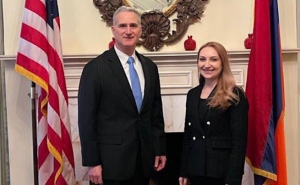 The Effect of "First Impression" in the US Presidential Elections
The Effect of "First Impression" in the US Presidential Elections

In the USA the first stage of the 2016 presidential elections has already launched. During this first stage, which is called primary, the residents in each state elect delegates who represent their preferred candidates (in the US people do not directly elect a candidate; they give their voice to delegates, who only then elect a candidate). In the second stage of the elections, in the national elections, the candidates from the two parties (Democrats and Republicans) who have manage to win in the first stage of the elections, compete against each other.
At present, the first stage of the elections took place in the two US states, Iowa and New Hampshire. In the Iowa elections won Texas senator Ted Cruz, while from the Democrats won Hillary Clinton. In the New Hampshire elections among the democrats won Bernie Sanders defeating Hilary Clinton, while among the Republicans won millionaire Donald Trump.
Before making predictions based on the results of the elections in these two states, we should take into consideration the fact that Iowa and New Hampshire are small states, they have small and at the same time not diverse population. That is why the outcome of the elections there cannot be representative and objectively predict the further process of the elections.
However, we can still identify four main factors, which can have their side effects on the final outcome of the elections.
First: Iowa and New Hampshire traditionally being the first state, where the elections took pace, have the effect of the so-called "first impression" somehow changing the attitude of people towards the elections. The winners in these states are perceived as the ones who are able to mobilize their supporters.
Besides being the first ones, the elections in these two states are most widely covered by the media as a result of which the candidate with low ranking, who succeeded in these elections, manages to raise his/her popularity.
Second: the American theorists divide the US states into the three groups: "blue" states belong to Democrats; "red" states belong to Republicans, while "purple" states are the ones with unpredictable outcome in elections. If in case of the first two ones the outcome of the elections almost always is predicable, in case of the third one the outcome is unpredictable and can be decisive. Both Iowa and New Hampshire are the so called swing or purple states, which explains such a great attention of the public towards the elections in these states.
Third: the experience proves that if the main candidates do not manage to succeed in the first two elections in Iowa and New Hampshire, then the amount of money given to them for electoral campaign reduces while the number of sponsors decrease.
Forth: based on the experience of the US previous elections the results of the elections in New Hampshire are a kind of "green light" for New England region, while the one in Iowa for Midwest.
Thus if we take into consideration the above mentioned factors, then we are to state that the impact of first stage of the elections in Iowa and New Hampshire on the next stages of the elections is going to be a midterm one. The extent to which this midterm impact will affect the final outcome of the elections is still too early to predict.
Other materials on this subject
- Around 25 Domestic Terrorism Cases Opened in US after Congress Storming About 25 cases of domestic terrorism were opened in the US following the unrest caused by supporters of US President Donald Trump in the Capitol building.
- Former New York City Mayor Mike Bloomberg Eyeing Presidential Bid He has not decided whether to run for president but is back to actively considering it and is taking this step to keep his options open.
- Putin: Trump Opponents Harm US with 'Invented' Russia Scandal Putin said the US opposition was not treating those who elected Mr. Trump with respect.
- Is Trump’s Replacement Realistic? However, how are the congressmen going to prove that Donald Trump is "incapacitated"?
- Will Putin-Trump Romance End Soon? ...to fully understand the logic of Trump’s policy towards Russia, it is helpful to get acquainted with the logic of deal-making introduced by Trump in his book entitled "The Art of the Deal'.
-
 17:08
17:08The regular session of the Anti-corruption Policy Council takes place in Jermuk
-
 15:05
15:05The Prime Minister sends congratulatory messages to the supreme leader of Iran and the President of Iran
-
 11:11
11:11Armenia sends earthquake aid to Turkey
-
 10:43
10:43Commemoration of the Pontiff St. Sahak Partev
-
 09:16
09:16Some roads are closed and difficult to pass in Armenia
-
 19:55
19:55Phone conversation of the Foreign Minister of Armenia with the U.S. Assistant Secretary of State for European and Eurasian Affairs
-
 18:30
18:30Prime Minister Pashinyan and President Khachaturyan meet
-
 18:20
18:20Ararat Mirzoyan with Co-Chairman of the OSCE Minsk Group of France Brice Roquefeuil
-
 17:01
17:01Humans could land on Mars within 10 years, Musk predicts
-
 16:45
16:45France, US urge 'immediate' end to Nagorno Karabakh blockade
-
 16:01
16:01Blockaded Nagorno Karabakh launches fundraiser to support quake-hit Syria
-
 15:59
15:59Earthquake death toll in Turkey rises to 18,342
-
 15:43
15:43Ararat Mirzoyan Held a Telephone Conversation with Sergey Lavrov
-
 15:06
15:06French president rules out fighter jet supplies to Ukraine in near future
-
 14:47
14:475 Day Weather Forecast in Armenia
-
 14:44
14:44President Vahagn Khachaturyan wrote a note in the book of condolences opened in the Embassy of Syria in Armenia
-
 14:20
14:20Azerbaijan’s provocations impede establishment of peace and stability – Armenian FM tells Russian Co-Chair of OSCE MG
-
 12:57
12:57France representation to OSCE: Paris calls on Azerbaijan to restore freedom of movement through Lachin corridor
-
 11:40
11:40Command of Kosovo forces highly appreciated preparation of Armenian peacekeepers
-
 10:16
10:16The United States withdrew from sanctions against Syria for six months the provision of assistance after the earthquake
day
week
month
Humidity: %
Wind: km/h









